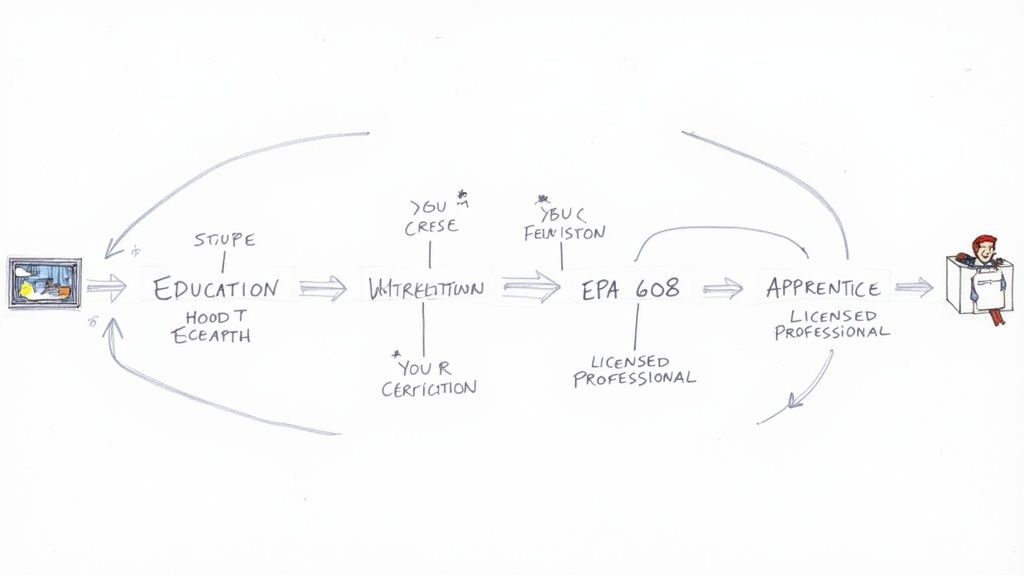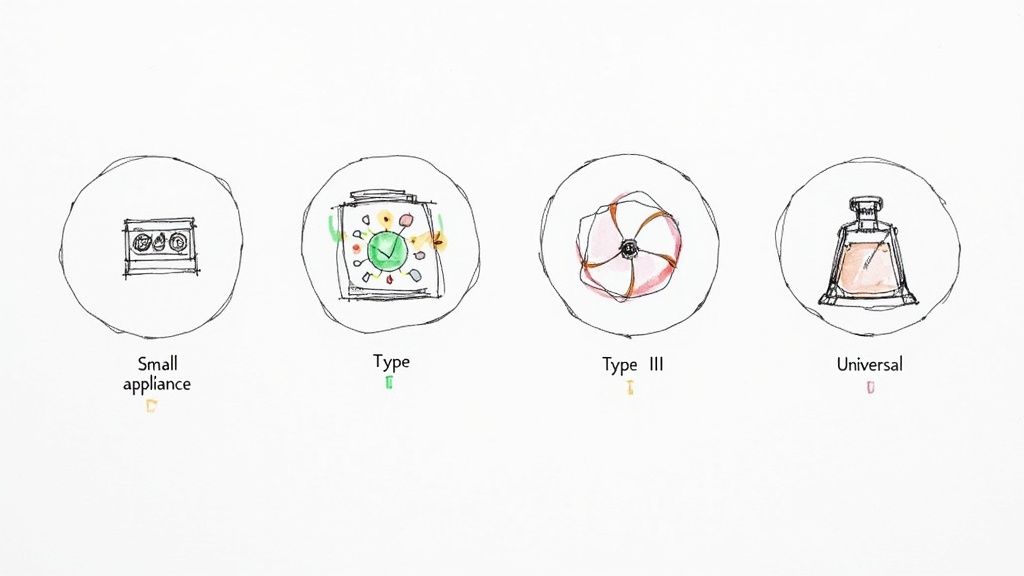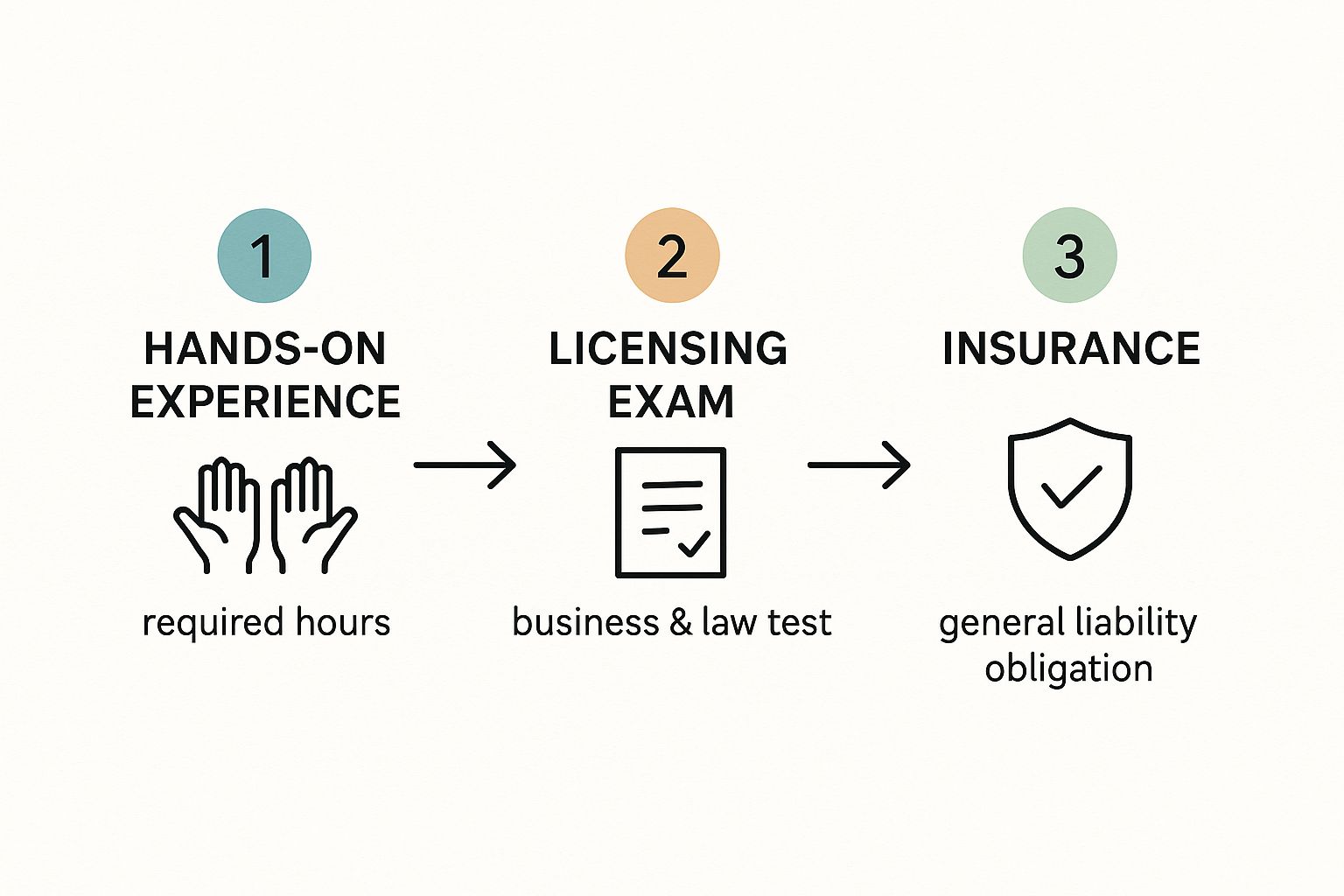If you're considering a career in HVAC, you're on the right track. It’s a field with steady work and high demand, but your journey starts with the right certifications. Think of credentials like the EPA 608 certification (which is mandatory for handling refrigerants) and the career-boosting NATE certification as your foundation. They prove you can work safely, legally, and professionally.
Your Blueprint for an HVAC Career
Jumping into an HVAC career is a smart move, especially with the high demand for skilled professionals. This path offers a stable and rewarding future, but it all hinges on having the right credentials. Certifications aren't just pieces of paper; they’re solid proof of your expertise and commitment to the trade. They show you know how to handle complex equipment and stick to strict safety and environmental rules.
For homeowners and businesses in communities like Kennesaw, Woodstock, and Marietta, hiring a certified technician from a trusted local company like Top Tech Mechanical means peace of mind. It’s their guarantee that the pro handling their AC installation or heating repair has met tough industry standards.

Why Certification Is Non-Negotiable
The HVAC world is built on a framework of rules designed to protect everyone—from the customer to the environment. Certifications are your way of showing you're compliant. For example, the EPA 608 certification is a federal requirement for anyone who works with refrigerants. Without it, you legally can't perform some of the most basic HVAC services.
Beyond the legal stuff, certifications build trust. When you can show a customer your credentials, you’re not just telling them you’re qualified; you’re proving it. This is a huge deal for jobs like commercial rooftop AC repair in Atlanta or an emergency heating call in Roswell, where there’s no room for error.
This guide is your roadmap. We’ll break down each certification so you can see the clear path from aspiring tech to licensed pro. As you get started, it's helpful to understand the value of professional certifications in any trade, as it really puts the journey into perspective.
To give you a quick snapshot, here’s a look at the certifications you’ll run into most often.
Overview of Key HVAC Certifications
| Certification Type | Is It Mandatory? | Primary Focus Area |
|---|---|---|
| EPA 608 | Yes, federally | Safe refrigerant handling & recovery |
| NATE | No, but highly recommended | Comprehensive HVAC knowledge & skills |
| HVAC Excellence | No, but respected | Validating hands-on skills & theory |
| State/Local License | Varies by location | Meeting regional codes & regulations |
Each of these plays a different role, but together they create a well-rounded, professional profile that opens doors.
Meeting a Critical Industry Need
The demand for skilled technicians is growing way faster than the workforce can keep up. The HVAC industry is facing a major shortage of certified pros, with an estimated 42,500 job openings annually in the United States alone. On a global scale, the market is set to grow at 7.4% annually between 2024 and 2030, which only adds to the pressure to train and certify new talent.
This shortage creates a huge opportunity for anyone entering the field. By earning the right certifications, you immediately become a highly sought-after candidate ready to fill a crucial role.
For companies like us at Top Tech Mechanical, serving areas from Acworth to Vinings, finding qualified technicians is our top priority. You can check out our HVAC career opportunities to see exactly what leading employers are looking for. Your certification journey is the first real step toward a successful and in-demand career.
Understanding the EPA 608 Certification
If you're serious about a career in HVAC, the very first, non-negotiable step is getting your EPA 608 certification. This isn't just a fancy certificate to hang on the wall—it's a federal requirement under the Clean Air Act.
Think of it as your license to work with refrigerants. Without it, you legally can't touch most air conditioning or refrigeration systems. It's that simple. This rule exists for a very good reason: to protect our environment from chemicals that can damage the ozone layer and contribute to climate change. The EPA 608 certification proves you know how to handle these substances safely.
Why This Certification is a Legal Requirement
These aren't just arbitrary rules made up to make life harder. They're a direct response to a global effort to manage harmful chemicals. As regulations around refrigerants and energy efficiency get tighter, the standards for technicians get higher, too.
In the U.S., every single technician who maintains, services, repairs, or disposes of equipment with refrigerants must have an EPA 608 certification. This one rule affects hundreds of thousands of professionals and is the legal foundation of responsible HVAC service. To get a feel for how these rules are shaping the industry, you can check out the latest insights on HVAC trends and workforce upskilling.
Here's a look at the EPA's official Section 608 program page, which lays out all the rules and resources for technicians.

As you can see, the program is comprehensive, covering everything from certifying technicians to restricting refrigerant sales and ensuring proper disposal.
The Four Types of EPA 608 Certification
The EPA 608 certification isn't a one-size-fits-all deal. It's split into four different types, each one matching a specific category of equipment. To pass, you'll need to answer at least 21 out of 25 questions correctly for each section.
-
Type I Certification: This is your entry point. It covers small appliances like residential refrigerators, window AC units, and vending machines that hold five pounds or less of refrigerant.
-
Type II Certification: This is the big one for most residential and commercial techs. It covers high-pressure systems, which includes just about every split system, rooftop unit, and heat pump you'll encounter in homes and businesses. If you plan on doing AC repair or AC installation in places like Cumming or Sandy Plains, you absolutely need this.
-
Type III Certification: This one's for the big stuff—low-pressure appliances. We're talking about massive systems like chillers, which you'll find in large commercial buildings and industrial facilities.
Universal Certification: This is the gold standard. A technician with a Universal certification has passed the exams for Type I, II, and III. It means you are legally qualified to work on any piece of equipment with refrigerant, from a mini-fridge to a building-sized chiller.
What to Expect on the Exam
Before you can get certified for any Type, you have to pass the Core Section exam. This is the foundation, covering the essential knowledge every technician needs, no matter what equipment they work on.
You'll be tested on key topics like:
- Ozone Depletion: Understanding the science behind how refrigerants affect the atmosphere.
- The Clean Air Act: Knowing the specific laws that govern our industry.
- Refrigerant Management: This is all about the "three R's"—Recovery, Recycling, and Reclaiming.
- Safety Protocols: How to handle refrigerants properly and detect leaks.
Once you pass the Core, you can take the exams for the specific Types you need. Honestly, most technicians go for the Universal Certification right from the start. It gives you the most flexibility in your career and makes you a much more attractive hire for companies like Top Tech Mechanical, since we handle everything from residential heating maintenance to complex commercial HVAC maintenance.
Advancing Your Career with NATE Certification
So, you've got your EPA 608 certification. That's the first crucial step, but what's next? If you're serious about your HVAC career, the answer is NATE certification.
Think of it like this: your EPA 608 is your driver's permit. It makes you legal to work on equipment. But getting certified by North American Technician Excellence (NATE) is like earning your commercial driver's license. It proves you're a pro who can handle anything the road throws at you. For employers and customers in areas like Roswell, Canton, and Kennesaw, a NATE-certified tech is a sign of true expertise and commitment.
What Makes NATE the Industry Benchmark
NATE certification isn't a government mandate; it's a voluntary credential created by the HVACR industry for the industry. It was designed to set a real-world benchmark for what a truly skilled technician knows. This isn't about memorizing a textbook—it's about proving you have the practical, hands-on knowledge to get the job done right.
That’s why contractors, manufacturers, and even the U.S. Department of Energy hold it in such high regard.
For a business like ours, hiring NATE-certified technicians is a no-brainer. Studies show it leads to fewer callbacks, lower warranty costs, and much happier customers. It means our teams performing AC maintenance in Milton or tackling a complex commercial rooftop replacement HVAC service in Marietta are operating at the highest level of the trade.
The official NATE website is your go-to hub for everything you need to start the journey, from exam info to study guides.

This platform is an essential tool for any tech serious about validating their skills and taking their career to the next level.
To understand the different roles these certifications play, let's break down the key distinctions between the must-have EPA 608 and the highly-respected NATE certification.
Comparing EPA 608 and NATE Certifications
| Attribute | EPA 608 Certification | NATE Certification |
|---|---|---|
| Purpose | A mandatory federal license required by law to handle refrigerants. | A voluntary professional credential that proves advanced skill and knowledge. |
| Focus | Legal compliance and safe refrigerant handling practices. | Real-world technical competency across various HVACR specialties. |
| Requirement | Legally required for any technician who works with refrigerants. | Not required by law but highly valued by employers and customers. |
| Reputation | The baseline for entry into the industry. Proves you are "legal." | The "gold standard" of the industry. Proves you are an "expert." |
| Path | Pass a single proctored exam for a specific type (I, II, III, or Universal). | Pass a Core exam plus one or more specialty exams (e.g., A/C, Furnaces). |
| Renewal | Certification does not expire and is valid for life. | Must be renewed every two years with continuing education or retesting. |
In short, the EPA 608 gets you in the door, while NATE sets you apart from the crowd.
Choosing Your NATE Specialty Path
NATE understands that HVAC isn't a one-size-fits-all field. That's why they don't offer a generic certification. Instead, you earn credentials in specific areas, letting you build a resume that perfectly matches your skills and career goals.
The process is straightforward. You need to pass two exams:
- The Core Exam: This is the foundation. It covers the essential knowledge, safety protocols, and principles every single HVAC tech needs to know inside and out.
- A Specialty Exam: Once you've passed the Core, you pick a specialty exam (or several) that aligns with your work.
Some of the most popular tracks include:
- Air Conditioning (AC) Service and Installation: A must-have for any tech working on residential or commercial cooling.
- Gas Furnace Service and Installation: Absolutely critical for anyone handling heating repair or heating installation.
- Heat Pump Service and Installation: Covers the specific mechanics of modern air-to-air heat pumps.
- Commercial Refrigeration: Tailored for techs who service equipment like walk-in coolers and freezers.
For any technician working in the diverse Metro Atlanta market, having certifications in both Air Conditioning and Gas Furnaces is a powerful combo that makes you valuable year-round.
Recertification and Continuing Education
Earning your NATE certification is a huge achievement, but the work doesn't stop there. NATE certifications are valid for two years, and this is by design. It ensures that certified pros are always up-to-date on the latest technology and industry standards.
To recertify, technicians must complete 16 hours of continuing education (CEH) in their specialty during the two-year period. If you prefer, you can also choose to retake your specialty exam before it expires.
This commitment to lifelong learning is what truly separates a NATE-certified professional. It tells customers that you're not just resting on what you learned years ago; you are actively mastering your craft. That's the kind of dedication that builds trust, whether you're called for routine heating maintenance or an emergency AC repair.
Navigating Georgia's HVAC Licensing Requirements
Getting certifications like the EPA 608 and NATE is a huge accomplishment. They’re proof that you have the skills and the know-how. But to legally run your own HVAC business or lead projects as a contractor in Georgia, you need to take the next step: getting a state-issued license.
Think of it this way: your certifications are like a college degree that proves your expertise. The license is the official permission from the state to open your own practice.
The rules might seem like a lot to take in, but they’re there for a good reason—to protect homeowners and make sure every job meets a high standard of quality. The main credential you'll be working toward is the Conditioned Air Contractor License, which is handed out by the Georgia State Board of Conditioned Air Contractors. This is the legal bedrock for any serious HVAC pro looking to run a business in places like Kennesaw, Marietta, or Atlanta.
What's the Difference Between Certification and a License?
It's easy to get these two mixed up, but they serve very different purposes.
- Certification is usually voluntary (except for the mandatory EPA 608) and shows you’ve mastered the technical side of things against a national standard. NATE is the perfect example of this.
- Licensure is a mandatory requirement from the state. It gives you the legal green light to perform HVAC work as a contractor. Getting licensed means proving your on-the-job experience, passing state-specific exams, and carrying the right insurance.
Basically, you get certified to show you know how to do the work. You get licensed to prove you're legally and financially cleared to do the work in Georgia.
This infographic lays out the core steps to getting your hands on a Georgia license.

As you can see, it’s a clear path that starts with hands-on experience, moves into formal testing, and finishes with getting your business financials in order.
The Georgia Conditioned Air Contractor License
Georgia splits its license into two main categories. The one you choose really depends on the size and scope of the jobs you want to tackle.
- Class I (Restricted) License: This license is for working on systems that are 5 tons of cooling or less and 175,000 BTU/hr of heating or less. To qualify, you’ll need four years of documented experience, with at least two of those years spent as a lead mechanic. This is a great starting point for techs focusing on residential jobs like AC installation and heating repair.
- Class II (Unrestricted) License: This is the big one. It lets you work on any HVAC system, no matter the size—from a small residential unit to a huge commercial rooftop system. The bar is a bit higher here, requiring five years of documented experience, again with two of those as a lead mechanic. You’ll also need to show you’ve worked on systems larger than 5 tons. This license is essential for handling services like Commercial AC Installation and RTU Replacement & Installs.
For both license types, time spent in an approved HVAC school can often count toward some of your experience requirements. And once you're running a business, knowing about financial incentives for your customers is a game-changer; you can get the full rundown on Georgia HVAC tax credits in our other guide.
The Exam and Financials
Once the state verifies your experience, it's time to hit the books for the exam. The test is open-book and covers your trade knowledge as well as business and law. You'll need to score at least 70% to pass.
The business and law section is just as critical as the technical part. It’s there to make sure licensed contractors understand things like labor laws, tax rules, and lien laws—all essential for running a business the right way.
After you pass the exam, you’re on the home stretch. The final step is to secure insurance and a bond. Georgia requires all licensed contractors to have general liability insurance. You might also need a surety bond, which is basically a financial promise to your clients that you'll do the job right and follow the code.
Finally, don’t forget that even with a state license, some local areas like Atlanta or counties like Cobb might have their own permits or registration rules. Before you start any project in cities like Dunwoody or East Cobb, always give the local city office a call to make sure all your bases are covered.
Your Step-by-Step Path to Certification
Trying to figure out all the different certifications and licenses can feel like you've been handed a complex machine with no instruction manual. Let’s break it down and map out a clear path that takes you from a newcomer to a trusted, certified HVAC professional right here in Georgia.
This isn't just about landing a job; it’s about stepping into a field where you are desperately needed. The demand for skilled HVAC techs is through the roof, thanks to new construction and the big push for energy-efficient buildings. The global HVAC market is expected to jump from $299.3 billion in 2025 to over $407 billion by 2030.
Even with that massive growth, the industry is facing a huge skills gap. We’re talking about an estimated 110,000 unfilled technician jobs in the U.S., with 25,000 technicians leaving the field every year. For anyone willing to follow the right steps, that shortage spells one thing: opportunity.
Step 1: Build Your Educational Foundation
Every great career starts with a solid foundation. For HVAC, that begins with a high school diploma or GED. Think of it as the baseline—it proves you have the core academic skills to handle the technical concepts you're about to dive into.
With that in hand, your next move is to enroll in a solid HVAC training program at a vocational school or community college. These programs, which usually run from six months to two years, are where the magic happens. They give you the perfect mix of classroom learning and hands-on lab work, teaching you the fundamentals of refrigeration, electricity, and heating systems.
Step 2: Gain Real-World Experience
Book smarts are great, but there's no substitute for getting your hands dirty. The best way to do that is through an apprenticeship or an entry-level job as a technician's helper. This is where all that theory you learned in school clicks into place.
You’ll be working alongside seasoned pros in places like Canton or Marietta, learning how to troubleshoot real problems, talk to customers, and handle the practical side of services like AC repair and heating installation. Plus, Georgia’s licensing board—like most states—requires several years of documented field experience, so this step is non-negotiable.
Step 3: Secure Your EPA 608 Certification
Once you have some real-world experience, your next big goal is passing the EPA Section 608 exam. This is the one and only federally mandated HVAC technician certification requirement. Without it, you can’t legally touch or buy refrigerants. It’s that simple.
Here's a pro tip: Aim for the Universal Certification from the get-go. If you pass the Core, Type I, Type II, and Type III exams all at once, you're immediately more versatile and valuable to employers like Top Tech Mechanical. We handle everything from small residential units to massive commercial systems, so that flexibility is a huge plus.
Step 4: Pursue NATE Certification to Excel
After you've got your EPA 608, it’s time to really stand out from the crowd with NATE (North American Technician Excellence) certification. While it's not required by law, NATE is the gold standard in our industry. It tells employers and customers that you operate at a higher level of skill and knowledge.
You can even choose specialties that match your career goals, such as:
- Air Conditioning Service: Absolutely essential for any tech working in Georgia.
- Gas Furnace Service: A must-have for handling heating systems during our colder months.
- Heat Pump Installation: A great skill to have, especially as heat pumps get more and more popular.
Step 5: Obtain Your Georgia State License
The final hurdle is getting licensed as a Conditioned Air Contractor in Georgia. This involves proving you have the required years of experience, passing the state’s business and law exam, and getting the right insurance and bonding. Once that license is in your hand, you're officially authorized to run your own HVAC business in the state.
Mastering the skills for licensing also means becoming an expert in upkeep. To see what top-tier service looks like in action, check out our guide on creating an effective HVAC preventive maintenance checklist.
Common Questions About HVAC Certification
Jumping into an HVAC career is a fantastic move, but it’s natural to have questions about what it takes to get started. You're probably wondering about the time commitment, the costs, and what kind of education you really need. We get it.
This section is here to give you straight, simple answers to the questions we hear most often from aspiring techs. Let's clear things up so you can map out your career path with confidence.
How Long Does It Take to Get HVAC Certified?
The timeline to become a certified HVAC technician really depends on which credential you’re aiming for. Think of it as a mix of quick wins and a longer-term career journey.
For starters, you can knock out your foundational EPA 608 certification in just a few weeks of focused study. This is the must-have ticket that lets you legally handle refrigerants.
But becoming a fully licensed pro is more of a marathon than a sprint. Here’s a look at a typical timeline:
- HVAC Training Program: Most programs at a technical college run from 6 months to 2 years. This is where you’ll build your core knowledge and get crucial hands-on experience.
- On-the-Job Experience: To get a state license here in Georgia, you’ll need to put in 3 to 5 years of documented work, usually as an apprentice or junior tech.
So, while you can get your first certification relatively quickly, building the experience for advanced credentials like NATE and a state license is an investment that pays off over time.
What Is the Total Cost to Become an HVAC Technician?
The money you’ll invest in becoming an HVAC technician really comes down to the training path you take. The costs break down into a few main categories.
Your formal education is usually the biggest piece of the puzzle. A certificate from a technical school can range from $1,500 to $15,000, while an associate's degree will be on the higher end of that spectrum.
The good news is that the exam fees themselves are much more manageable. The EPA 608 exam usually costs less than $100, and NATE specialty exams run about $150 to $250 each. State licensing will add a few hundred dollars on top of that.
Don't forget about your tools! A solid starter set of hand tools, gauges, and meters is a must-have, and that can cost anywhere from $500 to over $2,000. It's smart to budget for both your schooling and the gear you'll need from day one.
Do You Need a College Degree for an HVAC Career?
Nope. A traditional four-year college degree is absolutely not required to build a successful, well-paying career in the HVAC industry. This is a trade where your hands-on skills and real-world experience speak much louder than a bachelor's degree.
The most common and effective route is earning a certificate or an associate's degree from a vocational school or community college. These programs are laser-focused on giving you the exact technical skills you'll use on the job.
Many of the best technicians in areas like Smyrna and Powder Springs got their start with just a high school diploma or GED and jumped right into an apprenticeship. This lets you learn the trade directly from seasoned pros while earning a paycheck. In this field, professional credentials like your EPA 608 and NATE certifications are the true seals of approval.
Is Continuing Education Required for HVAC Technicians?
For the best certifications in the industry, you bet. The HVAC world is always changing—new technology, updated regulations, and more efficient equipment are coming out all the time. Staying current is what separates the good techs from the great ones.
Your EPA 608 certification is valid for life, so you won't have to worry about renewing it. However, other key credentials have their own rules.
- NATE Certification: To keep your NATE-certified status, you have to renew it every two years. You can do this by completing 16 hours of continuing education in your specialty or by retaking the exam.
- State Licensing: Georgia's Conditioned Air Contractor license, like most state licenses, also requires renewal, which often includes continuing education courses.
This commitment to learning ensures that the pros handling AC maintenance in Johns Creek or a heating repair in Woodstock are always at the top of their game.
Ready to start your journey with a team that values expertise and professional growth? At Top Tech Mechanical, we're always looking for skilled, certified technicians to serve communities across the greater Atlanta area, from Dallas and Hiram to Austell and Cartersville. We offer a supportive environment where you can build a lasting career. Learn more about our company and explore opportunities with us by visiting https://toptechmech.com.


